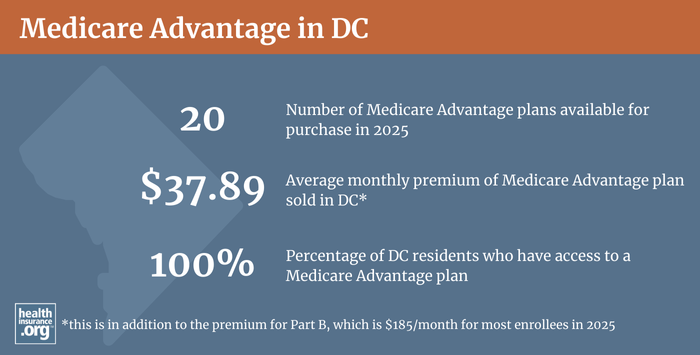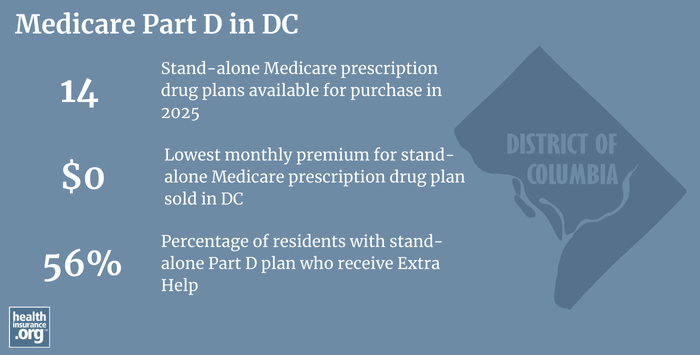
Medicare in District of Columbia
Original Medicare, Medicare Advantage, Part D prescription drug, and Medigap coverage in Washington, DC
Key takeaways
- About 95,000 residents are enrolled in Medicare in DC.1
- 33% of DC Medicare beneficiaries are enrolled in private Medicare plans.1
- Beneficiaries of Medicare in DC can select from among 14 stand-alone Part D prescription plans in 2025, with premiums starting at $0 per month.2

Medicare enrollment in District of Columbia
As of September 2024, there were 95,974 residents with Medicare in the District of Columbia.1
Most Americans become eligible for healthcare coverage through Medicare when they turn 65. But Medicare eligibility is also triggered when a person has been receiving disability benefits for 24 months (people with ALS or end-stage renal disease do not have to wait 24 months for Medicare enrollment). About 12% of DC’s Medicare beneficiaries are under the age of 65.1
Medicare options
Medicare operations are run by the Centers for Medicare and Medicaid (CMS). CMS is part of the federal Department of Health and Human Services (HHS).
While Medicare is funded and run by the federal government, enrollees can choose whether they want to receive their benefits directly from the federal government via Original Medicare or enroll in a Medicare Advantage plan offered by a private insurer, if such plans are available in their area (Advantage plans are available in almost all areas of the country).
Original Medicare includes Part A (also called hospital insurance, which helps pay for inpatient stays, like at a hospital, skilled nursing facility, or hospice center) and Part B (also called medical insurance, which helps pay for outpatient care like a doctor appointment or a preventive healthcare service, such as most vaccinations). Medicare Advantage plans bundle Parts A and B under a single premium and often include other services like prescription drug (Part D) and vision coverage.
There are pros and cons to Medicare Advantage and Original Medicare, and no single solution works for everyone.
Learn about Medicare plan options in DC by contacting a licensed agent.



Explore our other comprehensive guides to coverage in DC

The ACA Marketplace allows individuals and families to shop for and enroll in ACA-compliant health insurance plans. Subsidies may be available based on household income to help lower costs.


Hoping to improve your smile? Dental insurance may be a smart addition to your health coverage. Our guide explores dental coverage options in the District of Columbia.


Learn about DC’s Medicaid expansion, the state’s Medicaid enrollment and Medicaid eligibility.


Short-term health plans provide temporary health insurance for consumers who may find themselves without comprehensive coverage. Learn more about short-term plan availability in DC.

Frequently asked questions about Medicare in District of Columbia
What is Medicare Advantage?
As of July 2024, about 33% of DC’s Medicare beneficiaries were enrolled in Medicare Advantage plans,1 up from 16% in 2018 (but well below the national average of about 50%).3 DC previously had Medicare Cost plan coverage available (as of 2018), but that was no longer the case as of 2019 (By that point, the only available private Medicare plans in DC were Medicare Advantage plans).
Medicare Advantage enrollment is available during Medicare’s annual election period (October 15 to December 7 each year). This window allows Medicare beneficiaries the opportunity to switch between Medicare Advantage plans and Original Medicare and/or add or drop a Medicare Part D prescription plan. Medicare Advantage enrollees also have the option to switch to a different Advantage plan or to Original Medicare during the Medicare Advantage open enrollment period, which runs from January 1 to March 31.

What are Medigap plans?
Original Medicare does not limit out-of-pocket costs, so most enrollees maintain some form of optional, supplemental coverage. More than half of Original Medicare beneficiaries nationwide receive their supplemental coverage through an employer-sponsored plan or Medicaid; Medicaid help in paying for Medicare coverage is subject to income limitations. But for those who don’t, Medigap plans (also known as Medicare supplement plans) are designed to pay some or all of the out-of-pocket costs (deductibles and coinsurance) that Medicare beneficiaries would otherwise have to pay themselves.
DC does not regulate Medigap plans, so federal rules apply in the District (in the rest of the country, state regulations apply to Medigap plans if they go above and beyond what’s required by the federal government). The DC Department of Securities and Banking does not maintain a list of Medigap insurers — although they noted that they are considering doing so in the future. But Medicare’s plan finder tool indicates that there are 16 insurers offering Medigap plans in DC.
Medigap plans are sold by private insurers, but the plans are standardized under federal rules, with ten different plan designs (differentiated by letters, A through N). The benefits offered by a particular plan (Plan F, Plan G, etc.) are the same regardless of which insurer is selling the plan. So plan comparisons are much easier for Medigap policies than for other types of health insurance; consumers can base their decision on premiums and less tangible factors like customer service, since the benefits themselves are uniform. All Medigap insurers must offer at least Plan A. And if they offer any other plans, they must offer at least Plan C or Plan F.
Unlike other private Medicare coverage (Medicare Advantage and Medicare Part D plans), there is no annual open enrollment window for Medigap plans. Instead, federal rules provide a one-time six-month window when Medigap coverage is guaranteed-issue. This window starts when a person is at least 65 and enrolled in Medicare Part B (you must be enrolled in both Part A and Part B to buy a Medigap plan).
People who aren’t yet 65 can enroll in Medicare if they’re disabled and have been receiving disability benefits for at least two years, and more than 12,000 beneficiaries with Medicare in DC are under 65. Federal rules do not guarantee access to Medigap plans for people who are under 65, but the majority of the states have stepped in to ensure at least some access to private Medigap plans for disabled enrollees under the age of 65. DC does not regulate Medigap plans though, so federal rules apply. Insurers can voluntarily choose to offer Medigap plans to people under 65. According to Medicare’s plan finder tool, two insurers in DC offer Medigap plans to beneficiaries under the age of 65: CareFirst and United American (in both cases, premiums are much higher than they are for 65-year-old applicants).
Federal legislation, including 2018’s H.R.6431, and 2019’s H.R.1394, has been considered to expand access to Medigap plans to all Medicare beneficiaries regardless of age, but the rules have thus far not changed.
In DC, a disabled Medicare beneficiary under age 65 can enroll in a Medicare Advantage plan, as these plans are guaranteed-issue for all Medicare beneficiaries. And when they turn 65, they have access to the normal Medigap open enrollment period, and can select from among any of the available Medigap plans, at the standard age-65 rates.
Although the Affordable Care Act eliminated pre-existing condition exclusions in most of the private health insurance market, those regulations don’t apply to Medigap plans. Medigap insurers can impose a pre-existing condition waiting period of up to six months, if you didn’t have at least six months of continuous coverage prior to your enrollment. And if you apply for a Medigap plan after your initial enrollment window closes (assuming you aren’t eligible for one of the limited guaranteed-issue rights), the insurer can look back at your medical history in determining whether to accept your application, and at what premium.
What is Medicare Part D?
Original Medicare enrollment does not cover outpatient prescription drugs. More than half of Original Medicare beneficiaries have supplemental coverage via an employer-sponsored plan or Medicaid, and these plans often include prescription coverage. But Medicare enrollees without creditable drug coverage need to obtain Medicare Part D prescription coverage. Part D coverage can be purchased as a stand-alone plan, or as part of a Medicare Advantage plan with integrated Medicare Part D benefits.
Insurers in the District of Columbia are offering 14 stand-alone Medicare Part D plans for sale in 2025, with premiums that start at $0/month.2
As of July 2024, there were 71,088 Medicare beneficiaries in DC with Part D prescription coverage.1 The majority (more than 40,000 people) had stand-alone Medicare Part D plans, while the rest had Medicare Advantage plans with built-in Part D coverage.1
Medicare Part D enrollment is available during Medicare’s annual enrollment period each fall, from October 15 to December 7. Plan changes made during this time will take effect January 1. Part D enrollees are encouraged to carefully compare the available plan options each year, as a different plan might present a better value for the coming year. This can be due to changes in the beneficiary’s prescription needs, or to changes in the available plans (including the person’s existing plan), such as the covered drug lists, participating pharmacies, and out-of-pocket costs.

What additional resources are available for Medicare beneficiaries and their caregivers in DC?
For more information about Medicare benefits in DC or for assistance applying for Medicare coverage, try one of these resources.
- Contact HICP, DC’s Health Insurance Counseling Project, for general help with Medicare in DC.
- Visit the Department of Aging and Community Living website or call them at 202-724-5626.
- The DC Office of Disability Rights has an overview of Medicaid and Medicare benefits for disabled District residents.
- The DC Office of Health Care Ombudsman and Bill of Rights has a compilation of resources that would be helpful for Medicare beneficiaries in DC.
- The Medicare Rights Center is also an excellent resource for Medicare-related questions. The national helpline number is 1-800-333-4114.
Louise Norris is an individual health insurance broker who has been writing about health insurance and health reform since 2006. She has written dozens of opinions and educational pieces about the Affordable Care Act for healthinsurance.org.

Looking for more information about other options in your state?
Need help navigating health insurance options in District of Columbia?
Explore more resources for options in DC including ACA coverage, short-term health insurance, dental and Medicaid.
Speak to a sales agent at a licensed insurance agency.
Footnotes
- “Medicare Monthly Enrollment – DC.” Centers for Medicare & Medicaid Services Data. Accessed November, 2024. ⤶ ⤶ ⤶ ⤶ ⤶ ⤶ ⤶
- ”Fact Sheet: Medicare Open Enrollment for 2025” (26) Centers for Medicare & Medicaid Services. Sep. 27, 2024 ⤶ ⤶
- “Medicare Monthly Enrollment – National.” Centers for Medicare & Medicaid Services Data. Accessed November, 2024. ⤶

